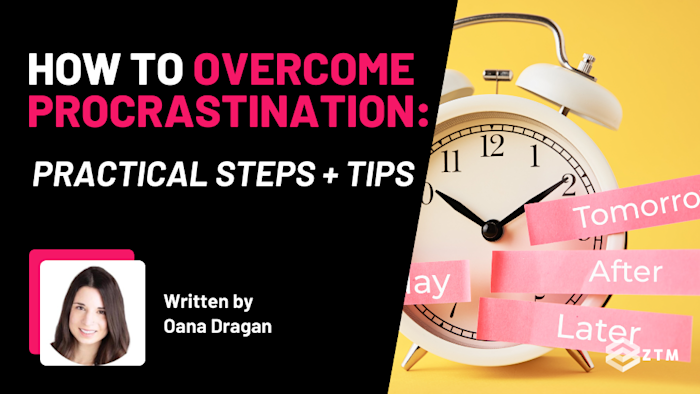Procrastination sucks. You can go weeks being fine and super productive, learning new skills in the evening, hitting work goals, or juggling both.
And then one week you feel a bit meh about getting started. Other weeks, it's a genuine effort to even think about the task. But the week before, you could have been on top of your game, so what gives?
Everyone suffers from procrastination to different degrees at different points in their careers and lives. However, most people don’t realize that there are ways to work around this.
In this guide, I’m going to walk you through the common causes that trigger this as a response, as well as how to deal with them in the future.
So let’s get into it.
Why listen to me? HI, I’m Oana Dragan, and I’m the resident productivity expert here at Zero To Mastery, with over 10+ years of experience teaching others to be more productive, creative, and focused with meditation.
I teach the ‘Learn to Meditate from Scratch’ course, and just released a brand new meditation specifically designed to help with procrastination.
I know what you’re thinking - “Why would I want to stop and meditate if I’m trying to get things done?” I’ll cover that in just a second.
But first, let’s start off by understanding what procrastination actually is - because it’s not laziness or even a lack of organization.
Understanding procrastination
Procrastination is something that many people face, especially with the freedom of flexible deadlines, or when trying to reach your own goals.
In fact, studies show that around 20% of adults are chronic procrastinators, regularly delaying tasks despite knowing the negative consequences.
However, what most people don't realize is that procrastination is not about laziness or lack of self-control. It’s actually a coping mechanism for dealing with challenging emotions and negative moods induced by certain tasks - be it boredom, anxiety, insecurity, frustration, resentment, self-doubt, or unworthiness.
We seek to soothe the immediate and negative emotions that the task at hand induces in us, rather than following through with what is in our long-term benefit and interest.
When confronted with a daunting task that triggers anxiety or insecurity, the amygdala, known as the brain's "threat detector," interprets the task as a genuine threat, potentially to our self-esteem or overall well-being.
This makes it worse, in that our capacity for making thoughtful, future-oriented decisions diminishes further under stress.

So despite our logical understanding that procrastinating on the task will lead to greater stress later on, our brains prioritize immediate threat removal. This phenomenon is termed "amygdala hijacking."
Once we get stuck in it, it’s hard to get out of it.
This usually leads to us resenting it and being hard on ourselves, but ironically, this only makes it worse, because what we focus on, is usually what we pull towards us.
For example
If I told you not to think of a pink elephant, you would immediately think of it instead. Likewise, trying to not be stressed usually makes you think about how stressed you are.
So what can we do? Well, there are a few things actually…
7 actions you can take, to overcome procrastination today
Some of these are going to seem a little woo-woo.
I’m also aware that if you’re suffering from procrastination right now and struggling to finish or even start a project, it’s going to feel like it makes no sense. However, I promise that if you try each of these tips, you’ll find it not only easier to come out of your procrastination habit right now, but you’ll also make it far less likely that you’ll slip back into it in the future.
Just give them a try and see what happens.
Step #1. Acknowledge and accept procrastination
The first thing to understand, as I said already, is that everyone procrastinates. Acceptance of this is a powerful tool because when procrastination is resisted, it creates a mental battle that increases stress and makes it harder to start tasks.
Instead, observe procrastination without judgment. Notice when procrastinating and what feelings arise - maybe it’s anxiety, fear, or boredom. By accepting these feelings and acknowledging that procrastination is part of the current reality, it’s possible to reduce internal conflict and start working with procrastination rather than against it.
In a 2010 study, researchers found that students who were able to forgive themselves for procrastinating when studying for a first exam ended up procrastinating LESS when studying for their next exam.

They concluded that self-forgiveness was conducive to productivity as it allowed the student to move past their unhelpful behavior and focus on their upcoming examination without the burden of their past acts looming upon them and making them feel even worse.
So if procrastination happens, acknowledge your feelings of overwhelm and reassure yourself that it’s natural to feel this way. Self-compassion can reduce the negative emotions that fuel procrastination and create a more supportive environment for moving forward.
Ultimately, it’s about accepting what is and forgiving, so you can get yourself free of the loop that you’re in. Treat yourself with the same kindness you’d offer a friend.
Another great way to break that loop? Meditation.
Step #2. Use meditation to address emotional causes and rest your brain
Meditation can be a powerful way to address the emotional triggers of procrastination, as well as reboot your thinking and pause that destructive loop.
(It’s very hard to be anxious while actively doing exercises that lower stress responses).
By practicing mindfulness and meditation, you can also become more aware of your thoughts and feelings, reduce stress, and develop a more compassionate attitude towards yourself. This can help you understand the emotional triggers behind your procrastination and develop healthier coping mechanisms.
Consider setting aside 10-15 minutes each day for a meditation practice specifically designed to tackle procrastination.
This meditation might include:
- Breathing exercises to calm the mind
- Guided visualization to see yourself completing tasks
- Mindfulness to observe your thoughts and feelings without judgment
- Positive affirmations to boost your confidence and motivation (more on these later)
Regular practice of this meditation can help you build a more constructive relationship with procrastination.
If you want a guided meditation specifically to help with procrastination, then be sure to check out my latest meditation inside of the ZTM Academy.

The great thing about using meditation like this is that it’s not only great for overcoming procrastination - but it's a great habit to stop the initial triggers from building up again in the future.
However, it’s not the only option.
Step #3. Plan your day to reduce decision fatigue
Mental fatigue is one of the key causes of procrastination. We’re already tired and things seem more difficult, and we start telling ourselves how we can’t get them done. Or worse, we simply don’t have the energy. This is why planning and building a routine work so well because they help reduce mental fatigue from happening.
Heck… Zuckerberg used to wear the same outfit every day for years to reduce his own decision fatigue. He just bought multiple copies of an outfit he liked and wore it daily, so that it was one less thing to think about.

It seems simple, but by outlining your most important tasks the evening before, you can start your day with a clear direction and purpose.
Every night, take a few minutes to review your plans for the next day, identify the key tasks you need to accomplish, and allocate specific times for each. This method ensures that your primary goals are prioritized.
If you also try to set these specific tasks for a certain time and create a routine around it, you’ll also find it much easier to stick to. Having set times for work, breaks, and leisure activities creates a structure that can make it easier to maintain productivity even during low-motivation periods.
You can also take it a step further and be smart about how you approach completing these tasks.
Step #4. Break down tasks into smaller, manageable steps
Another core reason why we procrastinate is because tasks seem overwhelming. Breaking down a large project into smaller, manageable steps can make it feel less intimidating and more achievable.
For instance, if you need to build a website, break it down into smaller tasks such as setting up the project environment, designing the layout, writing the HTML structure, adding CSS for styling, and implementing JavaScript for interactivity.
Focusing on one task at a time makes the project less overwhelming and more manageable.
Speaking of which, we can even take it a step further and make sure we complete that first step.
Step #5. Use visualization techniques to build confidence and motivation
Visualization is a surprisingly effective technique that can help reduce anxiety and boost your confidence.
Basically, by vividly imagining yourself successfully completing a task, you prepare your mind for the actual experience, making it feel more achievable and less daunting. This mental rehearsal not only eases the task but can also significantly enhance your performance.
In 1996, a study at the University of Chicago demonstrated the power of visualization. Students were randomly selected to take a series of free throws, and their success rates were recorded. They were then divided into three groups with different tasks for 30 days:
- The first group was instructed not to touch a basketball for 30 days
- The second group practiced shooting free throws for half an hour each day
- The third group spent half an hour each day visualizing successful free throws with their eyes closed, but didn’t practice either
After 30 days, all three groups took the same number of free throws as they had at the beginning of the study. The results were striking:
- The first group, which did not practice, showed no improvement.
- The second group, which practiced daily, improved by 24%.
- The third group, (which never practiced and only visualized making free throws, improved by 23%.
The group that visualized their success nearly matched the improvement of the group that practiced physically. (This has been proven multiple times over different research papers).
So by helping yourself see the task through - or even just visualizing the success of that first step, you can make it easier to take and succeed.
Step #6. Use affirmations to reinforce positive actions and build confidence
A great way to lock in that visualization is with affirmations. These are positive statements that you say to yourself and can help you challenge and overcome self-sabotaging thoughts.
By regularly repeating affirmations, you can reinforce positive actions and boost your confidence, making it easier to overcome procrastination.
Create a list of affirmations that resonate with you, such as:
- "I am capable of completing my tasks"
- "I can tackle challenges with ease"
- "I am motivated and productive"
- "I believe in my ability to succeed"
Repeat these affirmations daily, especially before starting the task that you’ve been putting off. This practice can help you develop a positive mindset and reduce the likelihood of procrastination.
Step #7. Engage in healthier alternatives to fulfill cravings for instant gratification
Another great way to stop procrastination from kicking in, is to stop the things that trigger it.
So here’s the deal - procrastination often provides instant gratification, as it allows you to avoid tasks that are challenging or uncomfortable. However, this gratification is short-lived and can lead to stress and guilt.
Finding healthier alternatives to fulfill these cravings can help you stay productive and feel better in the long run, and want to give in less often.

For example
Instead of procrastinating by scrolling through social media, try engaging in activities that provide a similar sense of reward but are more productive. Take a short walk, do a quick workout, or meditate for a few minutes.
These activities can help you reset your mind and return to your coding tasks with renewed focus and energy.
Take action on this today
Procrastination can be a major hurdle, but it’s something everyone deals with at various points in their lives. Understanding the underlying causes - whether it’s emotional stress, decision fatigue, or task complexity- can empower you to manage and overcome it.
By applying the strategies outlined in this guide, such as practicing self-compassion, planning your day, breaking down tasks, visualizing success, and using affirmations, you can turn procrastination from a persistent problem into a manageable challenge.
Remember also that the journey to overcoming procrastination involves consistent effort and self-awareness. One powerful tool to help you on this journey is meditation. Not only can it address the emotional triggers behind procrastination, but it can also help reset your mind and build resilience.
For a guided meditation specifically designed to combat procrastination, check out my latest meditation session available on the ZTM Academy. Start your path to greater productivity and mental clarity today.
Take action now, and transform how you approach your tasks and goals. You’ve got this!


![Learning to Meditate [Productivity & Focus]](https://images.ctfassets.net/aq13lwl6616q/2a7NI2zgRFphCk8pnDHBYF/34433f9991c8952427f112d428014bc6/Meditation_Thumbnail_2-_Academy.png?w=600&h=335&q=50&fm=png&bg=transparent)

![Learning to Learn [Efficient Learning]](https://images.ctfassets.net/aq13lwl6616q/6VWcUgLgG0SU55ORlILe2S/e186361aeb48561bcd19ae6486577022/Learning_to_Learn.jpg?w=600&h=336&fl=progressive&q=50&fm=jpg&bg=transparent)




